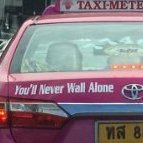What The West Needs To Learn About Democracy From Thailand
-
Recently Browsing 0 members
- No registered users viewing this page.
-
Topics
-
-
Popular Contributors
-
-
Latest posts...
-
4
Accident Korean Crashes Toyota Alphard into Multiple Vehicles on Pattaya Road
Was he auditioning for the next Fast and Furious movie -
8
Report Bangkok Senator Accused of Attempted Rape by Ex-News Anchor
FORMER NEWS STAR SAYS IT ALL -
13
Report Thai Coconut Industry Ends Monkey Labour to Win Back Trust
In other words a number of large corporates have set up an industry group that will operate to maintain their market position using mechanisation and high-investment new crop trees, all at the expense of the little guy with the monkey. What's next: it's 'cruel' to use a buffalo to pull a plough? -
11
First 90 Day and funds are under 800k
No, you are correct. I miss typed. I meant to say they are not tyrants. At least that is my impression outside of Jomtien where it can be challenging conversing with some of the IOs. To their defense, I don't take the visa process as seriously as I should but that is how I roll 🙂- 1
-

-
45
USA New Video Footage Chilling School Attack Foiled by Teens Amid Alleged Honor Killing Attempt
Ohhhhhhh...... How will I sleep tonight Anyway, I thought I would post your comment of condemnation of this cowardly attack, carried out by a barbarian, who does not deserve to be called a father, or even a human being. Oops Nothing but attacks on other posters. Which tells me everything I need to know.- 1
-

-
1
Bank statement for Non-O: Savanakhet and Vientiane
Thinking that would be accepted however is it worth it when a visit to the bank they can issue you a 3 month bank statement with hopefully a pretty official bank stamp.
-
-
Popular in The Pub




.thumb.jpg.4fd22303fa94eb0a6ebf5a9cf7194eb4.jpg)










Recommended Posts
Create an account or sign in to comment
You need to be a member in order to leave a comment
Create an account
Sign up for a new account in our community. It's easy!
Register a new accountSign in
Already have an account? Sign in here.
Sign In Now